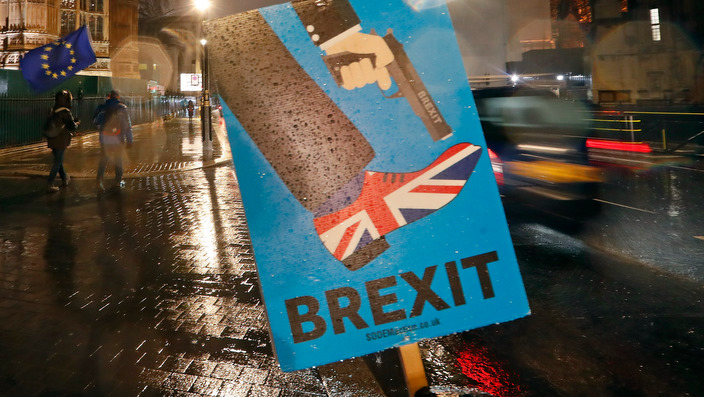When it comes to going out for a meal, Brits love nothing more than a good curry.
But the future of the traditional English curry house is uncertain because of a lack of qualified chefs.
Indian and Bangladeshi communities were some of the biggest backers of Brexit after being told immigration laws would be relaxed once restrictions were placed on European migration.
Many restaurant owners now say they feel they were used by the ‘leave’ campaign.
The United Kingdom's national dish isn’t fish and chips, it’s Chicken Tikka Masala, ever since government minister Robin Cook claimed in 2001 it was “a true British national dish”.
But the traditional British Curry House, a fixture on nearly every high street, is under threat.
Restaurant owners say immigration controls are too tight and preventing them from hiring the South Asian chefs they desperately need.
Abdul Ahad is the Owner of ‘City Spice’, a fixture on London’s Brick Lane, the capital’s most famous destination for Indian restaurants.
“Why can’t England open up for business? These people pay taxes, contribute to society, once they’re finished here they’ll go back. They won’t harm the fabric of society,” says Mr Ahad.
Many restaurant owners thought Brexit would fix the staff shortage.
Prior to the referendum, the leave campaign targeted Indian, Pakistani and Bangladeshi communities.
Here’s the former leader of the UK Independence Party, Nigel Farage, speaking at the British Curry Awards.
“The curry culture in this country, it’s a remarkable statement of the relationship this country has with the Commonwealth countries in the Middle East and far east, it’s rather wonderful isn’t it. We’ve given up with spam fritters, we’ve given up toad in the hole, we’ve given up plum jam and all the awful old English food now, we eat curry and we love it,” Mr Farage said.
But now, many in the curry industry feel they were used.
Oli Khan owns four restaurants in London’s commuter belt and is the Secretary-General of the Bangladeshi Caterers Association.
“We supported the leave campaign, but at that time some of the senior members of the British parliament, they’d promised us, if you support Brexit, we’ll get more people from South Asia, which is very unlikely now, we don’t know what’s going to happen,” says Mr Khan.
As it stands, the British government hasn’t made clear how immigration laws will change post-Brexit and no commitment has been made to increasing Commonwealth immigration.
Abdul Ahad says the promises made are now worth nothing.
“There were so many things said to gain the votes of the Bangladesh Caterer’s Association and the people related to the industry, just to get them on board. There were so many things said, so many ideas floated around just to buy the votes, just to get hold of the votes, and once they got hold of the votes, it never materialised,” Mr Ahad said. The industry association says an additional 30,000 workers are needed immediately and without access to more staff, it’s estimated half the current curry houses will be gone in 10 years.
The industry association says an additional 30,000 workers are needed immediately and without access to more staff, it’s estimated half the current curry houses will be gone in 10 years.

An anti-Brexit placard near the British Parliament. Source: AAP
One suggestion to solve the problem is a so-called ‘Vindaloo Visa’, a one-year work permit that would allow South Asian curry chefs to come to the UK to work, and pass on their knowledge to a new generation of British-born trainees.
Enam Ali is a supporter of the proposal.
He’s a restaurant owner and the founder of the British Curry Awards, an event supporting the industry which attracts high-profile politicians and celebrities each year.
“I’m very hopeful that after the Brexit the immigration policy will be fairer for all over the world. If someone wants to come from eastern European country, it’s very easy to come to this country, just have a driving licence. But when someone wants to come from outside the EU, it’s hundreds of documents. Specifically when I’m talking about bringing a chef. Chef needs to speak English (but they say) 'I’m not here to learn English, I’m just here to cook a curry,” says Mr Ali.
Currently, a cook would need to be earning nearly 30,000 pounds a year to be granted a work visa, but the average chef’s wage in the UK is 25,000.
Reducing that income requirement could ease the strain on the industry.
Back in Brick Lane, Abdul Ahad has seen dozens of curry houses close in the last few years.
But he doesn’t think Britain’s taste for spice has diminished.
“I’m keen to expand - if I had the staff I’d expand tomorrow. My product is good, my brand is good. But there’s no point me expanding tomorrow without any staff,” Mr Ahad says.
With the government refusing to make any immigration commitments until the Brexit deal is sorted, the curry crisis is set to continue.
Listen to this feature in Punjabi by clicking on the player at the top of the page.







